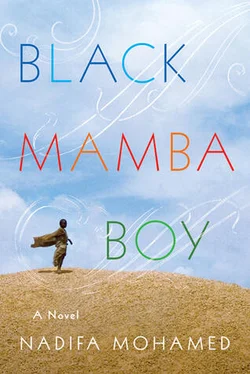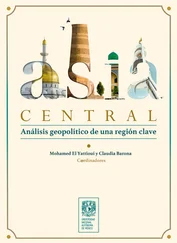He could hear the driver’s heart pounding near his ear and the gears of the vehicle crunching beneath him. The askaris, relaxed by Jama’s vigilance, fell asleep, their heads lolling from left to right in unison.
“Hey, you’re good at this, little boy. You wanna work for me?” the driver said. Jama exchanged smiles with him in the rearview mirror.
After a few hours they finally reached the manicured avenues of Asmara. Everywhere new houses sparkled, the paint on them barely dry. Large Italian villas were painted in mouth-watering reds, corals, pinks, yellows; blossoming purple-and-white flowers flowed over their walls. It was the tidiest, most fertile place Jama had ever seen. A cool breeze breathed in through the driver’s window. Trees rustled at the side of the road, cleaners swept the immaculate sidewalks, and there was so much paving that everywhere seemed covered in patterned stone tiles. Jama looked around, and all the shops were run by Europeans, the town seemed to belong to the fat-bellied men with upturned mustaches sitting outside the shops. Women in dresses that exposed their arms and legs cycled up and down the gentle slopes. The only Africans he could see were the street cleaners.
“It’s strange, isn’t it? Don’t worry, they have been generous enough to leave us a scrap of land farther down,” said the driver.
Jama leaned across the askaris so he could see more clearly through the dirty window. Three-story buildings with columned fronts towered over the lorry as they passed down the main avenue. A huge cathedral with an iridescent mosaic cross appeared before them, and women in black-and-white gowns stood on the steps picking at their prayer beads as the church bell tolled. Large-eyed Eritrean beggars sat by the wall of the cathedral, swathed in dirty white shammas.
Jama shouted, “Look! Gaadhi dameer!” and pointed excitedly as a donkey cart drove past, the donkey cantering and swishing its tail, a small boy holding the reins. A little piece of Hargeisa transported to this foreign town.
The driver found the way to the African reservation and slowed down. “Where do you want me to drop you off?” he asked.
“Farther down, where the Somalis are,” answered one of the askaris. They drove on and drew to a halt outside a tearoom full of Somali men.
Jama let the askaris pay his half lira for him. The driver beeped the horn for Jama. “Nabad gelyo, peace be with you,” he called out before the lorry pulled away.
“Are you going to pay for the food, little man?” one askari asked.
Jama begrudgingly picked out a few coins from Idea’s handkerchief. He expected adults to always subsidize him, but these teenagers had no manners. “Get me a lot, I’m hungry,” he demanded.
The askaris returned with full plates. “Who are you looking for here?” asked the taller askari.
Jama shrugged, confident that someone would take him in. “Anyone, an Eidegalle, I suppose.”
“I’ll go and ask in the tearoom,” the tall one said, getting up. Jama could see him circulating around, shaking hands, making jokes. The askari came back a while later, trailed by a lame man with a basketful of charcoal in his hands. They exchanged salaams.
“An old Eidegalle woman lives this way, but I warn you that she can be difficult,” said the charcoal seller.
The houses in the reservation were small and packed together, with animals tied to poles outside. “It’s this one,” said the new man, stopping at a beehive-shaped tukul with a rush mat serving as a door.
Jama shook the rush mat, and the askaris stepped back as an old woman with a hard face and humped back pushed aside the mat.
“Who are you?” she asked brusquely. Jama recited what he knew of his lineage, skipping over grandfathers and mangling old-fashioned names. He explained that he was en route to Sudan and just needed somewhere to sleep for the night.
“What does a little runt like you want in Sudan?” the old woman challenged.
“I am going to find my father,” Jama shot back.
“Are you sure you have one?”
The lame man was laughing with the askaris as they returned to the tearoom. Jama turned to march away from the old witch.
“Wait, wait! Don’t take an old woman’s words so seriously. You can stay for a night. My name is Awrala.”
They sat far apart in the hut, listening to the couple next door fighting until they also fell quiet. Jama, feeling overwhelmed by the silence, cracked. “How did you get that hump on your back?” he asked.
Awrala cackled. “Ha! You see, boy… my father came here to be a farmer — well, that is not completely true, he actually got bored of the hard work very quickly and made us into farmers. I spent all day like this.” She demonstrated the bentover posture, balancing her hands on her thighs.
“From the age of five to eighteen, I plowed, and sowed and watered and harvested, hard work like you young people would never believe,” Awrala boasted.
Jama wanted to tell her about all the carcass-delivering he had done in Hargeisa but he left it. A light in her eyes had switched on.
“Then the Italians came and took over his land. Finito! Boof! It was gone, all that hard work wasted. It was beautiful land, so much water and life, unlike our own barren country, but I am still bent over, over a broom now, cleaning Italian villas. Do you want to feel it?” she said, laughing.
Jama was taken aback but his fear of her had gone. He walked behind Awrala, and she guided his hand over the hump. It was as hard and knobbly as a tortoise’s shell, and seemed a heavy thing for such an old woman to be carrying around everywhere. He tried to knead it under his hands but it was too firm.
Awrala chuckled under his fingers. “Enough now, it’s ticklish, get some sleep.”
“Do you want me to tread on your back?” offered Jama, pitying her poor misshapen spine.
“No, no, your weight would break me,” she said, stifling a yawn. She arranged their blankets on the floor and curled up under hers.
“My head is killing me,” Jama whispered.
“Don’t worry, sleep it off. You’re not used to the altitude here,” she replied sleepily.
Jama, unable to sleep, tried to keep Awrala awake. “Don’t you have children?” he asked.
“No, after three husbands I accepted I was barren,” replied Awrala, clicking the beads of her tusbah.
“Why don’t you go back to Hargeisa, then?”
Awrala perked up. “Why should I? I’m not Somali anymore. The place where you are born is not always the best place for you, boy. There is nothing in our country. I have got too used to the rain, hills, and cool air of Asmara. I’ll be buried here.”
Jama listened to Awrala’s breath whistling through her teeth. He understood the desire to find the most beautiful place and stop there. He imagined what Sudan must look like, its rivers, its tall trees and great markets, until he finally fell asleep.
The morning air was frosty and hazy, the grass wet with dew. Everywhere stood moldy green stumps where trees had been cut down for firewood. A smell of burnt coffee and charcoal emanated from the little dwellings, acrid in the sharp air, and Jama coughed and hawked along with the men emerging from the huts. The heat from Awrala’s tea warmed his stomach but his face, fingers, and feet were numb. It was as cold as an October morning in Hargeisa. He had always wanted to see the rumored ice fall from the sky during the dry season, but wondered why God didn’t send the ice to Aden where it was needed more. They left the African reservation and walked down a steep hill; they passed women and girls marching sure-footedly uphill, carrying bundles of sticks and firewood bigger than themselves, their torsos bent over with the strain. To Jama they looked like bewitched women taken over by monstrous humps, with tentacles trying to reach out to other victims. A bus sped past, and the women jumped quickly out of the way as it skidded dangerously close; the bundles on their backs fell apart. At the front of the bus a few white faces peered out while all the black passengers were squashed in the back. Awrala led the way with a speed that made a mockery of her age, pushing people out of her way. As they got closer to the railway station, Italians appeared, porters trailing behind them with suitcases and large trunks. The station was crammed with workers and travelers milling around like termites. All the men wore hats even though they might be barefoot. On the platform, Jama found the iron beauty that would take him to his father; she had a snub nose and big round eyes, and shone radiantly green through the cloudlike steam.
Читать дальше
Конец ознакомительного отрывка
Купить книгу












